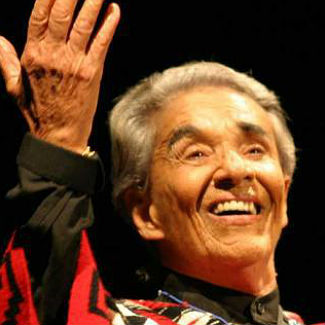Music |
Chavela Vargas (1919-2012)
By
Published: Oct 23, 2023
Category:
World
I never heard of Chavela Vargas until she died. But an email and an obituary got me moving; hours later, limp and in thrall, I knew I’d have to tell you about her.
“The Edith Piaf of Mexico,” with 80 records to her credit. That’s the shorthand. It’s too simple.
In fact, you’ve seen her, briefly, in “Frida,” Julie Taymor’s movie about Frida Kahlo. Vargas lived with Frida and Diego Rivera for a few years; she was almost certainly Kahlo’s lover. She appears in the film as Death, singing one of her best-known songs, “La Llorona” (“The Widow”). To listen, click here.
In the film, you see a restrained performance. Chavela Vargas was anything but. Let me count the ways.
Born in Costa Rica: “My parents… never loved me, and when they divorced I stayed with my uncles — may they burn in hell!”
At 14, fled to Mexico, began performing on the street and in Acapulco clubs. Her style was cancion ranchera: folk music, accompanied on guitar, with a decided populist tilt. And when she sang, there was no effort to replicate male singing styles. Vargas was rough. And blunt. And gay. And beloved.[The CD is way too expensive. For the MP3 download, click here.]
She didn’t publicly acknowledge she was gay until she was 81, but she never hid it: ”I’m very proud of being what I am, but I don’t shout it. I am who I am. I don’t have a label. My name is Chavela Vargas….Nobody taught me to be like this. I was born this way. Since I opened my eyes to the world, I have never slept with a man. Never. Just imagine what purity. I have nothing to be ashamed of.”
Her look: In chaste, Catholic Mexico, she wore pants on stage. Carried a gun on stage. Swigged tequila on stage.
She didn’t change the words of love songs to make them sound as if she were singing to a man. “Macorina,” which she recorded in 1956, includes these lyrics: “Your breasts like pineapple flesh/ your mouth like a sweet blessing/ of ripe guanabana juice…
She was a great interview, greater as she aged.
About that revolver: ‘I only shoot in the air when I hear a noise at night, so that they [the animals that wreck her garden] know there’s someone here. But when I was young and drunk, I’d shoot in every direction.”
About love: “It’s good while your liver and your gallbladder are working.”
About courage: “I was never afraid of anything because I never hurt anyone. I was always an old drunk.” (She was sober for the last 30 years of her life.)
Her death: “Maybe I’ll die on a Sunday and I’ll ruin the day for everyone, because everyone is lazy that day.” (She died on a Sunday.)
A great character. But it’s as a singer that she’ll live on. Pedro Almodóvar, the filmmaker who was her close friend, has praised “la voz aspera de la ternura” — the rough voice of tenderness. “I don’t think there is a stage big enough in this world for Chavela.”
There was. Carnegie Hall. At 83, she made her debut there. When she stepped on stage, there was an ovation. The audience was like an animal. The affection was deeper than you hear even for a beloved performer.
“Chavela Vargas made of abandonment and desolation a cathedral in which we all found a place.”
A cathedral at which many can worship
BONUS VIDEOS
When Chavela met Frida: click here.
The movie about her: click here.
(Many thanks to the much-missed Joan Schenkar)


